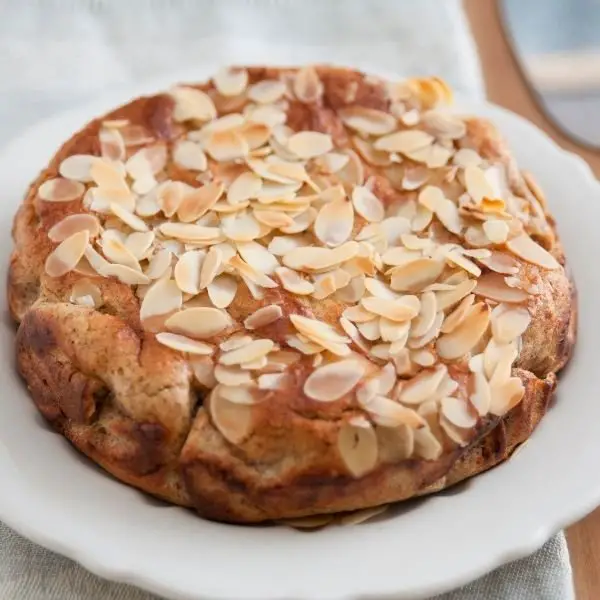Sfouf cake, a traditional Middle Eastern dessert, holds more than just cultural significance. With its distinctive golden color and unique flavor profile, sfouf cake offers various health benefits that make it more than just a delectable treat.
Packed with wholesome ingredients and rich flavors, this beloved dessert can provide a delightful indulgence without compromising on nutrition.

Nutritional Composition of Sfouf Cake
Before diving into its health benefits, let’s examine the nutritional composition of sfouf cake. This delectable dessert is primarily made from semolina, turmeric, anise, and other ingredients that contribute to its unique taste and texture.
Semolina, a coarse flour made from durum wheat, forms the base of sfouf cake. Turmeric, a vibrant yellow spice, gives it the distinct color, while anise adds a subtle licorice-like flavor.
These ingredients, when combined, create a delightful sensory experience that is both visually appealing and enticing to the taste buds.
Boosts Energy and Mood
One of the notable health benefits of sfouf cake is its ability to provide a quick energy boost. Semolina, being a carbohydrate-rich ingredient, offers a readily available source of energy.
Consuming sfouf cake can provide a burst of vitality, making it an energizing snack or dessert option. Additionally, sfouf cake contains saffron and anise, which are believed to have mood-enhancing properties.
These natural ingredients may contribute to a sense of well-being and uplifted mood, making sfouf cake a delightful treat that can boost both energy and mood.
Good Source of Antioxidants
Sfouf cake also offers a range of health benefits due to its antioxidant content. Turmeric, a key ingredient in sfouf cake, contains a compound called curcumin, which exhibits powerful antioxidant properties.
Curcumin helps neutralize harmful free radicals in the body, reducing oxidative stress and supporting overall health. Additionally, sesame seeds, often used as a topping in sfouf cake, are rich in antioxidants that further contribute to its health-promoting effects.
Supports Digestive Health
Another advantage of sfouf cake lies in its potential to support digestive health. Semolina, a primary ingredient, is an excellent source of dietary fiber.
Fiber plays a crucial role in maintaining a healthy digestive system by promoting regular bowel movements and preventing constipation.
Including sfouf cake as part of a balanced diet can contribute to a well-functioning digestive system and improved overall gastrointestinal health.
Promotes Heart Health
Consuming sfouf cake in moderation may offer benefits for heart health. Turmeric, an integral component of sfouf cake, contains curcumin, which has been associated with various cardiovascular benefits.
Curcumin is believed to help maintain healthy blood pressure levels, support proper blood circulation, and reduce the risk of heart disease. Sesame seeds, another ingredient in sfouf cake, are rich in heart-healthy fats and can help maintain healthy cholesterol levels.
Gluten-Free Option
For individuals with gluten intolerance or celiac disease, sfouf cake offers a gluten-free alternative to traditional wheat-based desserts.
With the availability of gluten-free variations, people with specific dietary restrictions can still enjoy the unique flavors and textures of sfouf cake without compromising their health or experiencing discomfort.
Cultural and Social Significance
Beyond its health benefits, sfouf cake holds a significant place in Middle Eastern cuisine and culture. It is often associated with celebrations, family gatherings, and special occasions.
The preparation and sharing of sfouf cake have deep-rooted cultural traditions, making it more than just a dessert but a symbol of togetherness and joy.
How to Make Sfouf Cake
While it’s possible to find sfouf cake in Middle Eastern bakeries and restaurants, making it at home can be a rewarding experience. Here’s a simple recipe to create your own sfouf cake:
Ingredients:
- 1 ½ cups semolina
- 1 cup sugar
- 1 teaspoon turmeric powder
- 1 teaspoon anise seeds
- 1 teaspoon baking powder
- ½ cup vegetable oil
- 1 cup milk (or non-dairy alternative)
- Sesame seeds for topping
Steps:
- Preheat the oven to 350°F (175°C) and grease a square baking dish.
- In a mixing bowl, combine the semolina, sugar, turmeric powder, anise seeds, and baking powder.
- Add the vegetable oil and milk to the dry ingredients. Mix well until a smooth batter forms.
- Pour the batter into the greased baking dish and sprinkle sesame seeds on top.
- Bake for approximately 25-30 minutes or until a toothpick inserted in the center comes out clean.
- Allow the sfouf cake to cool before cutting it into squares or diamond-shaped pieces.
Moderation and Balanced Diet
While sfouf cake offers several health benefits, it’s important to consume it in moderation as part of a balanced diet. Like any dessert, it contains sugar and calories that should be accounted for within a well-rounded eating plan.
Enjoying sfouf cake occasionally, along with a variety of nutrient-rich foods, can help maintain a balanced approach to nutrition.
FAQs
Yes, sfouf cake is typically vegetarian-friendly as it does not contain animal-derived ingredients.
Sfouf cake is best consumed within a few days of baking. However, if stored in an airtight container, it can last for up to a week.
When consumed in moderation, sfouf cake is generally safe and well-tolerated. However, individuals with specific dietary restrictions or allergies should carefully consider the ingredients used and consult with a healthcare professional if needed.
Yes, sfouf cake can be frozen for future consumption. Wrap individual slices or the entire cake tightly in plastic wrap and place them in a freezer-safe container. Thaw in the refrigerator before serving.
While the traditional sfouf cake recipe is widely popular, there are variations that incorporate additional ingredients such as orange blossom water, rose water, or nuts like almonds or pistachios for added flavor and texture.
Conclusion
In conclusion, sfouf cake, with its rich cultural heritage and unique flavor profile, provides not only a delightful culinary experience but also various health benefits.
From boosting energy and mood to supporting digestive health and promoting heart health, this golden dessert made with semolina, turmeric, and anise offers a combination of wholesome ingredients that contribute to overall well-being.
